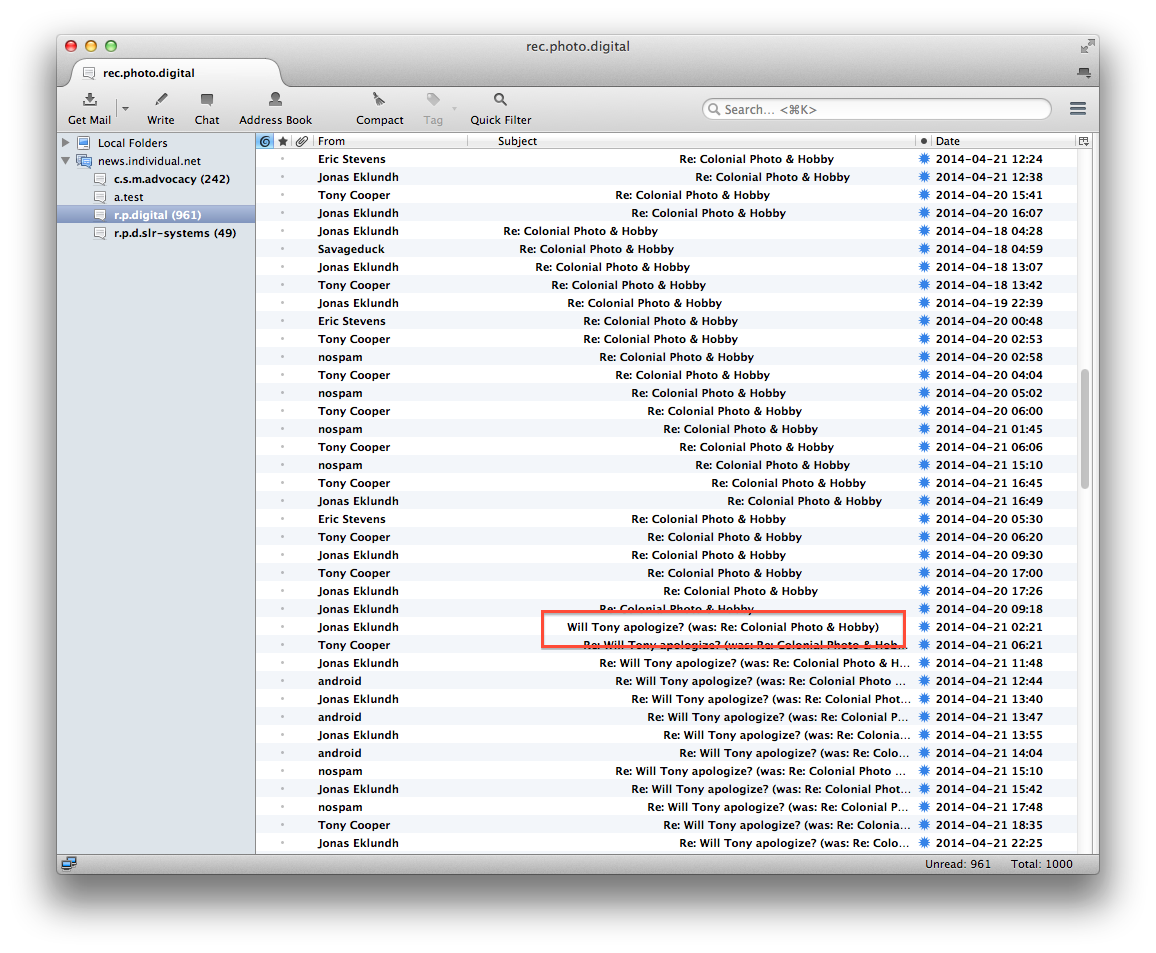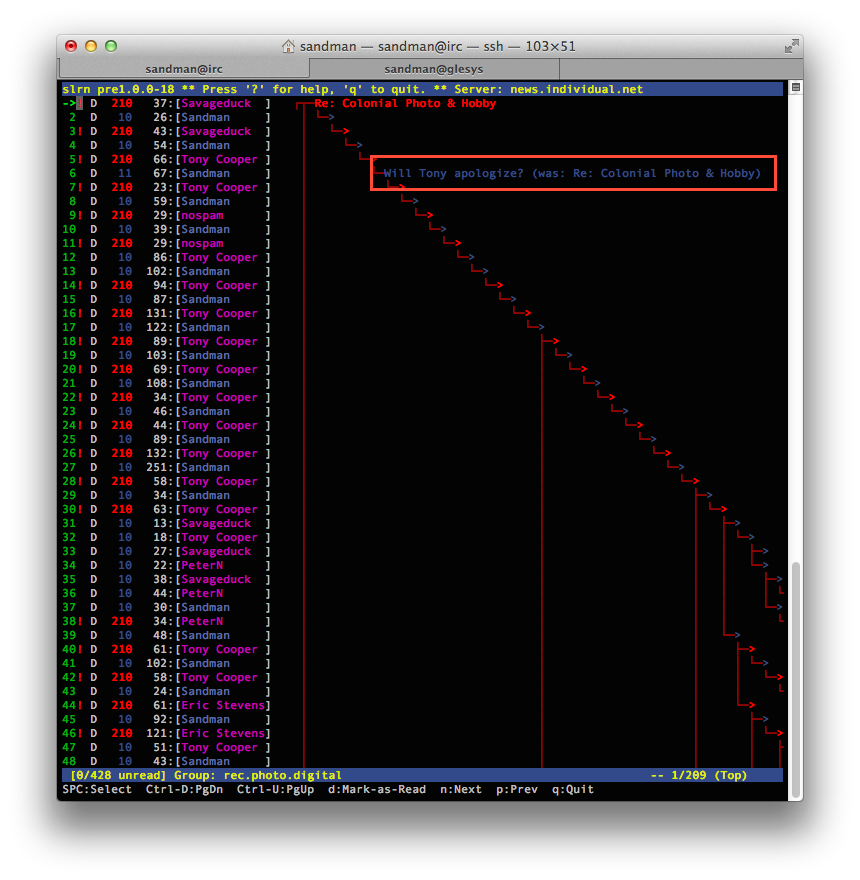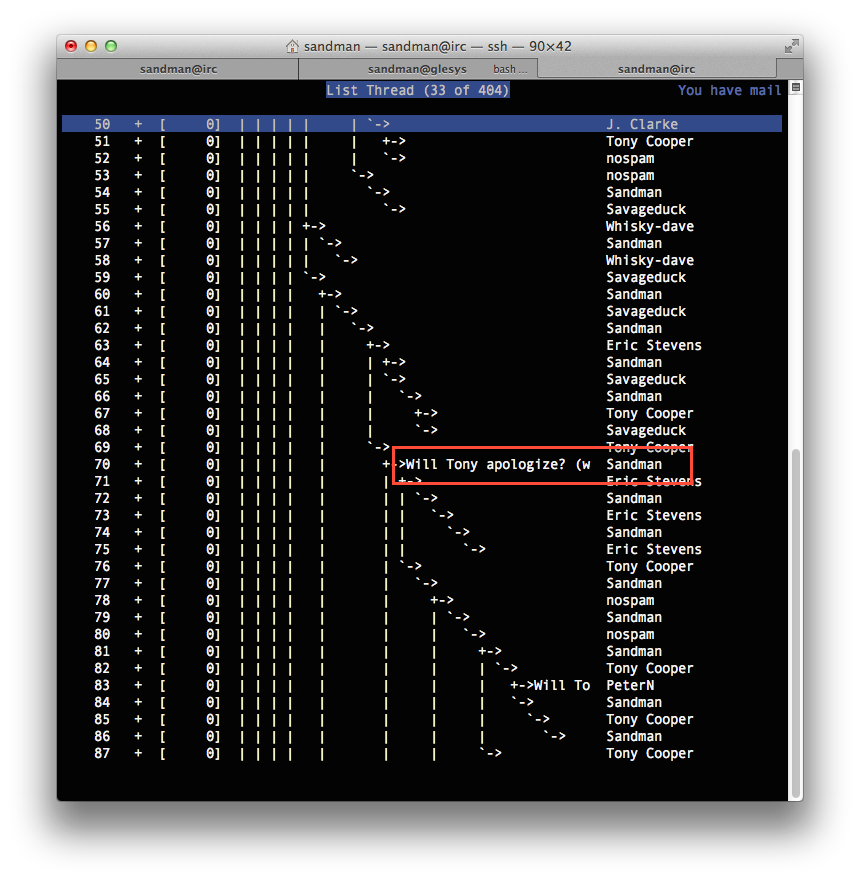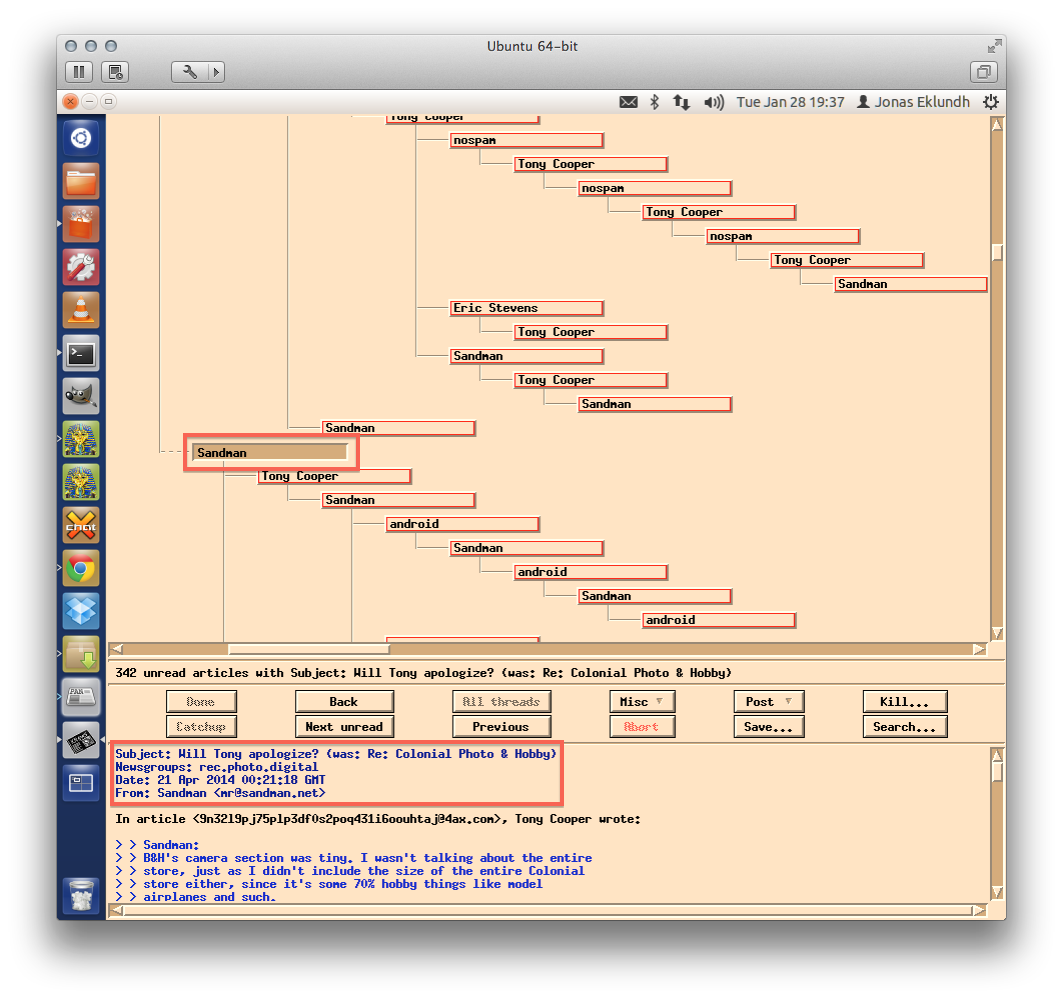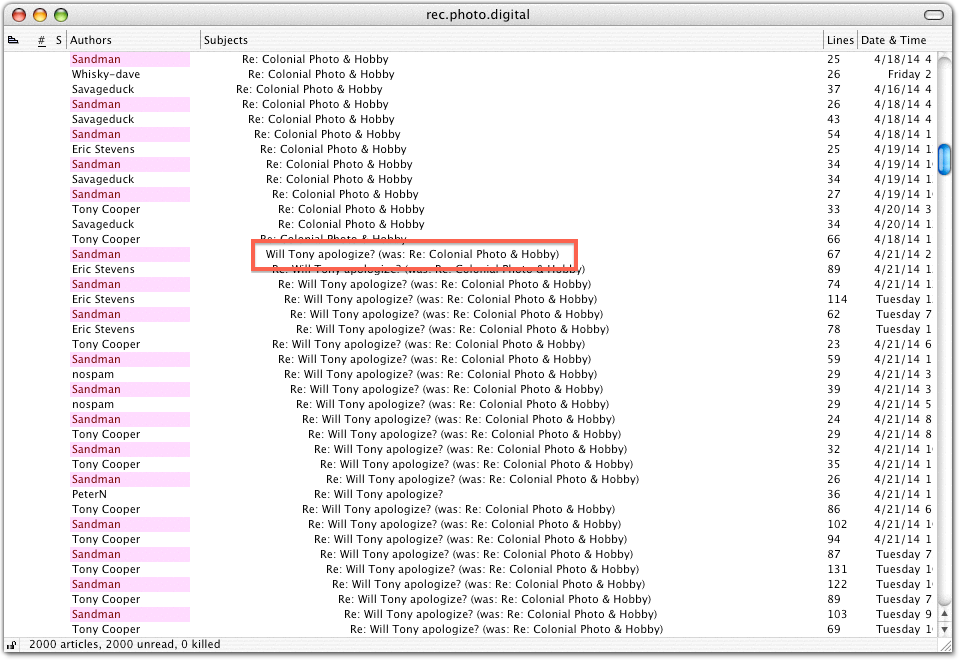Re: Will Tony apologize? (w...
Eric Stevens| Subject | Re: Will Tony apologize? (was: Re: Colonial Photo & Hobby) |
| From | Eric Stevens |
| Date | 2014-05-04 00:19 (2014-05-04 10:19) |
| Message-ID | <2kpam91sqi2tud50tf8su3avqej1mkef44@4ax.com> |
| Client | |
| Newsgroups | rec.photo.digital |
| Follows | Sandman |
| Followups | Savageduck (1h & 3m) Sandman (9h & 2m) |
On 3 May 2014 10:11:26 GMT, Sandman <mr@sandman.net>wrote:
SandmanWhat do you think RFC stands for? 'Request for comment'. RFC's are no more final documents than the history of the world.
In article <ic88m95686fjpno6i2ia5ht5seehk0uhak@4ax.com>, Eric Stevens wrote:<> <
> <
> <
> <
> <
> <
> <
>
SandmanOf course not. There are a multitude of news reader out there and I don't have access to them all for obvious reasons.I said there was a standard way of displaying hierarchies that is also in compliance with the RFC. You questioned that claim and I showed eight news clients, most of which are the most used news clients on usenet today (see my earlier post about usage stats).That doesn't PROVE that this is the standard way to show threads, but it SUPPORTS the claim, seeing how we have only ONE examples of a client that by default threads in a non-conforming way, and at least eight that does.So, currently, Agent is outnumbered by 8-1, which certainly substantiates the claim that there exists a standard and Agent is not following it.If you were to show me seven more news clients that does it the way Agent does it, then we have a "draw" as far as support comes, and I would either have to concede that it's not a standard, or find an order of magnitude more clients that does it the correct way.See, you can't "counter" my examples with the allusion that there might possibly be other clients that does it the way Agent does it.I made a claim and I supported it thoroughly. I do enjoy supporting my claims to a point where they can't be disputed, but I don't have the time, or access, to every single news client in the world - and unless you can come up with a good counter example, there is no need for me to do so.Eric Stevens
You don't learn anything from the past. You repeat the same falsified claims. You fail the Turing test at almost every level.
Don't you ever stop to notice that my posts are filled with logic, reasoning and actual discussion and your posts are just knee-jerk ad hominems? Doesn't that tell you something that you can't actually construct a counter-argument to the text above?SandmanEric StevensSandmanBut the question isn't about whether or not people want to "follow particular subjects", but about what constitutes a thread.Eric Stevens
It is possible they are the same thing.
But in this case they aren't, as I have shown.
Which do you think most people will want to: follow the reference list or follow the thread?
Do you mean the subject header? We've established with no uncertain terms that the *thread* is determined by the References header, so you're asking me if they want to follow the thread or follow the subject.
What I think isn't the topic here, though. But I think they much prefer to follow the thread than have a new thread displayed when someone changes the subject. This is also reflected in the way that most news readers handle this as well. If "people" wanted it some other way, the news clients would have adopted this other way a long time ago.SandmanYou have referred me to an article written by a person (Peter de Silva) which has no authority as a standard or reference.Eric Stevens
See also http://www.eyrie.org/~eagle/usefor/
Huh? That's YOUR link above. You referred yourself.Eric StevensSandman
This in turn refers the reader to a number of links, one of which is to draft proposal "Usenet Best Practice" written by C.H. Lindsey in 2005. This has a lengthy section on threading. The relevant text may be found in Section '3.3.2.1 Threading' at http://www.eyrie.org/~eagle/usefor/drafts/draft-ietf-usefor-useage-01.txt
Drafts doesn't interest me that much.
You are a devious liar with no conscience. You have ripped out a large block of relevant text and presented this fragment of what I wrote as though it was of what I quoted. Here is what is missing:Eric Stevens
Begin quote: ------------------------------------------------------------------------ Reading agents SHOULD present the articles in each newsgroup in an order which ensures that the reader never sees a followup or reply to an article unless he has already had an opportunity to read the original. However, this may be easier said than done. Here are some methods commonly used to fulfil this aim; none of them works perfectly.1. Present the articles in the order they were received at the local serving agent. However, articles propagated via different routes with different delays may well arrive out of order, so this may not be reliable.2. Sort the articles into order according to their Date headers. This will usually be better than the first method, but relies on the clock and timezone settings in posting agents being approximately correct. And although it satisfies the minimal recommendation at the head of this section, it will likely result in totally separate threads of discussion being merged in an unhelpful order.3. Sort the articles according to their Subject headers (or group them according to their Subject headers, with the groups being presented in order of the Date header of the first article in each group). Within a group with the same Subject, sort according to the Date header. This works tolerably well, but within a long discussion with many divergent subthreads, those subthreads are still merged in an unhelpful order. Moreover, it will occasionally bring together totally unrelated articles that just happen to have the same Subject by chance.Sandman
All of the above deals with *sorting*, I.e. when you're NOT grouyping articles into discussions. I've already shown you how a sorted list looks like, and your reply was to ask why anyone would want to look at a list that way.Eric StevensSandman
4. Construct a tree in which each article is within a sub-tree headed by each article mentioned in its References header, and present articles by a depth-first traversal of that tree, sorting the siblings within each branch according to their Date headers. This method is usually superior to the ones mentioned earlier, but it can go wrong for a number of reasons.
Exactly - when grouuped into a discussion (i.e. shown as a tree/hierarchy), you use the References header. You have a habit of quoting links that prove you incorrect.Eric Stevens
C. H. Lindsey [Page 21]Usenet Best Practice March 2005a) References headers are sometimes absent, or incomplete (and are even permitted to be trimmed when they get too long), and earlier articles in the threads may have expired off the local server. Nevertheless, with careful implementation, these problems are mostly surmountable.Sandman
Of course, I have even told you how.Eric StevensSandman
b) A poster may join an existing discussion (and clearly intend to do so by using the same Subject header, possibly with a prepended "Re: ") and yet his article might not be created as a followup to any specific precursor and hence would not have a References header. Hence it would be presented quite apart from the other (sub-)threads of that discussion.
Exactly - regardless of the subject, if the post *lacks* a References header, it is a new thread.Eric StevensSandman
c) Conversely, the topic of some sub-thread might have diverged so far from the original topic of discussion that some poster decides to create a totally new Subject for his followup. Nevertheless, that followup, and the whole sub- thread which issues from it, will still be presented in the midst of the other sub-threads of the original discussion.
100% of what I've been saying, and the exact opposite of what Agent does, that rips it out of the "midst of the other sub-threads" and displays it as a completely new thread.
Continued original quote:
5. To counter these various deficiences, various hybrid schemes have been devised which take account of all three headers, References, Subject and Date, and these often succeed in providing a more pleasing presentation to the reader. However, different readers can be pleased in different ways, and so it is often the case that reading agents provide configurable options to choose between several methods.
This document does not single out any particular method as "the best". They are all to be considered acceptable, and implementors are encouraged to experiment accordingly. Nevertheless, it is inevitable that some combination of Subjects and followups will eventually arise that defeats even the most sophisticated scheme.
It must be noted, however, in the case of those methods which rely on the comparison of Subject headers, whether to detect equality or for sorting, that there are certain additional precautions that need to be taken, such as:
a) [USEPRO] permits a back-reference "Re: " to be prepended (optionally) to a Subject when creating a followup. Therefore, that back-reference SHOULD be stripped away before performing any comparison of Subjects. On the other hand, "Re:" is the only back-reference permitted, and therefore it is not necessary for translations of "Re: " into other languages to be recognized (even though such translations are sometimes generated by non-compliant followup agents). Likewise, that "Re: " is case-sensitive, although non-compliant agents that generate "RE: " are common enough that it might be wiser to accept that form also.
b) It is not unknown for non-compliant followup agents to truncate the Subject header. Some reading agents therefore truncate the Subject before making any comparison. Sometimes this makes things better; sometimes it makes them worse.
c) The use of <encoded-word>s ([RFC 2047]) within Subject headers can give rise to different ways of encoding the same Subject. Therefore, such encoding SHOULD be undone before any comparison of Subject headers is made. It cannot even be assumed that the back- reference "Re: " is not within an <encoded-word>.
------------------------------------------------------------------------
It proved you 100% a devious liar when you deleted the bits you didn't like.Eric Stevens
End quoteNOW tell me there is a standard format.Sandman
There is, and it was nicely illustrated by your non-RFC link, and proved you incorrect and me 100% correct.
The important part is:
"5. To counter these various deficiences, various hybrid schemes have been devised which take account of all three headers, References, Subject and Date, and these often succeed in providing a more pleasing presentation to the reader. However, different readers can be pleased in different ways, and so it is often the case that reading agents provide configurable options to choose between several methods."
That is the part which applies to Agent.
--
Regards,
Eric Stevens
